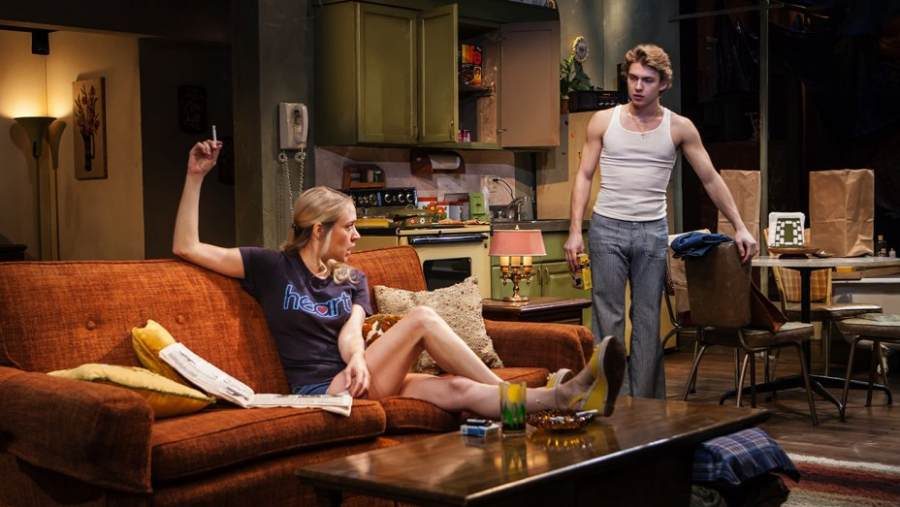

Tribal gangs may rule the mean streets of New York City but Mary Shannon, a drug addicted mother of two, rules the roost in Seth Zvi Rosenfeld's gripping family drama, Downtown Race Riot. Based on true events, this retelling produced by The New Group has some lovely performances lead by Chloe Sevigny, whose proximity to her audience in The Linney Theater at The Pershing Square Signature Center, serves to amplify her authentic portrayal.
Seth Zvi Rosenfeld’s take on Greenwich Village’s denizens is hard to watch, for some of the right reasons. We’ve cringed at a heroin-addicted mother figure named Mary before, in Eugene O’Neill’s greatest play, Long Day’s Journey Into Night. One could argue that in Rosenfeld’s play there are enough darkly nuanced ties of character and plot to make a comparison. However, the strongest link offered by the two gifted playwrights is the central theme that your family tribe will both support and destroy you; in Rosenfeld’s tribal rites, like those of O’Neill, you trust and love at your peril.
The plot is based on a true story, unpretentious and candid. Two young men, Jimmy “Pnut” Shannon and his best friend Marcel “Massive” Baptiste, a Haitian youth, are graffiti buddies and have decided to partake in a revenge riot, which is also a turf war. Pnut and Massive are obligated to join the riot, summoned by a local mobster, an offstage character named Baldo. Baldo has promised the boys he will watch out for Pnut’s mother, who is frequently dope-sick and vulnerable. Pnut and Massive are quickly joined by two young hoodlums, Tommy-Sick and Jay 114, who reveal privately to Pnut that his friend Massive is being set up, secretly demanding Pnut’s silence.
The action takes place in the apartment home of Pnut’s mother, Mary Shannon, a heroin-addicted bohemian whose mothering tendencies leave much to be desired. Living here with Peanut and Mary is Mary’s daughter Joyce, a lesbian who also taunts Pnut’s friends with sexual liaisons from time to time.
As Mary Shannon, the matriarch of the family, Chloe Sevigny is effortlessly authentic. She doesn’t disappoint as a heroin addict with a heart of gold, but it’s plated gold, at best. Her attempts at mothering though sincere have a cheap, coppery glint. Sevigny’s Mary Shannon has a slinky sexuality too; she’s all legs and lies and macramé tops. It’s an effective portrayal.
As Pnut Shannon, David Levi is brash and sweet and yearns for authority that his youth can’t offer. Moise Morancy is right on point as Massive; he’s got the right mix of smarts and hustle. Josh Pais as the family lawyer Mr. Gilman is always good, and his monologue about the positive effects of general cocaine use is a welcome comic jolt for the evening. Sadie Scott as Joyce Shannon has a Janice Joplin kind of earthiness; she’s tough and yet her loyalty doesn’t seem forced. Cristian DeMeo as Tommy-Sick brings a tough-guy quality that exceeds his years in a winning performance and Daniel Sovich as Jay 114 brings stoicism to his work that’s very compelling.
Temperate direction by Scott Elliott informs the pace for the evening, assisting the younger unseasoned players as best he can. The thrilling fight choreography by UnkleDave’s Fight House, founded by Dave Anzuelo is first rate. There’s an all-out brawl occurring late in the drama that I found very, very realistic and beautifully done.
Rosenfeld’s minor motifs end up a bit of a jumble; none of them resonate enough to create a strong bond between Pnut and Massive. Perhaps that’s just as it should be. I’m reminded of a quote from Martin Luther King: “In the end we will remember not the words of our enemies, but the silence of our friends." It’s Rosenfeld, after all, who writes a play that disarms the power of silence. Rosenfeld reminds us that love means nothing without taking care of our loved ones, the closest members of our warring tribes.